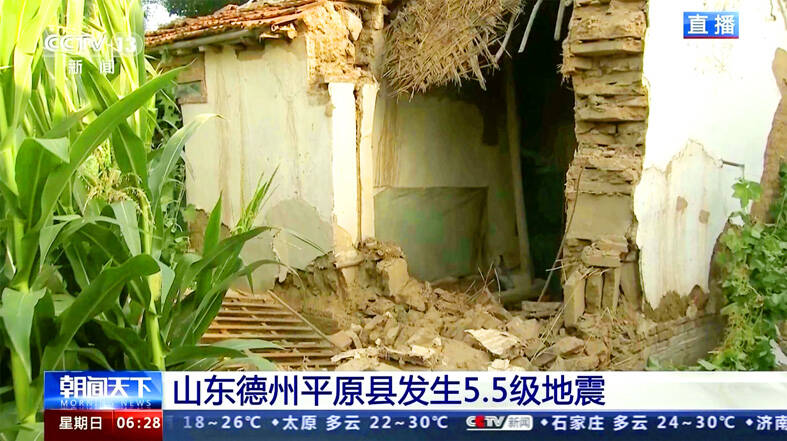A shallow magnitude 5.4 earthquake struck eastern China in the early hours yesterday, the US Geological Survey (USGS) said, with state media reporting at least 10 people injured and dozens of buildings collapsed.
Video footage on social media showed shaking light fixtures, trembling ground and people evacuating their buildings, with one clip showing people walking past bricks scattered on the ground.
The quake, which struck at 2:33am, hit 26km south of the city of Dezhou in Shandong Province, at a depth of 10km, USGS said.

Photo: AP
“The tremor was so strong ... during the earthquake my head was shaking on the pillow, I thought I was having a nightmare,” one person wrote in Sina Weibo from Shandong’s neighbouring Hebei Province.
USGS’ Prompt Assessment of Global Earthquakes for Response system, which provides preliminary assessments on the effect of earthquakes, issued a red alert — estimating extensive damage and some casualties were probable based on previous quake data.
Citing Shandong authorities, state broadcaster China Central Television said there were at least “10 injured” and 74 houses or buildings had “collapsed” from the earthquake, which was followed by 52 aftershocks.
The Chinese Ministry of Emergency Management launched a level four emergency response and dispatched a team to Shandong to lead the rescue work, Xinhua news agency said.
The quake was felt as far away as the cities of Beijing and Tianjin, as well as in Shanghai, about 800km from the epicentre
Earthquakes are not uncommon in China but it is rare for them to hit the eastern part of the country where most of the population and big cities are located.
An official from the Shandong Seismological Bureau said the possibility of a larger earthquake is “very small,” local media repoted.

Thousands gathered across New Zealand yesterday to celebrate the signing of the country’s founding document and some called for an end to government policies that critics say erode the rights promised to the indigenous Maori population. As the sun rose on the dawn service at Waitangi where the Treaty of Waitangi was first signed between the British Crown and Maori chiefs in 1840, some community leaders called on the government to honor promises made 185 years ago. The call was repeated at peaceful rallies that drew several hundred people later in the day. “This government is attacking tangata whenua [indigenous people] on all

RIGHTS FEARS: A protester said Beijing would use the embassy to catch and send Hong Kongers to China, while a lawmaker said Chinese agents had threatened Britons Hundreds of demonstrators on Saturday protested at a site earmarked for Beijing’s controversial new embassy in London over human rights and security concerns. The new embassy — if approved by the British government — would be the “biggest Chinese embassy in Europe,” one lawmaker said earlier. Protester Iona Boswell, a 40-year-old social worker, said there was “no need for a mega embassy here” and that she believed it would be used to facilitate the “harassment of dissidents.” China has for several years been trying to relocate its embassy, currently in the British capital’s upmarket Marylebone district, to the sprawling historic site in the

The administration of US President Donald Trump has appointed to serve as the top public diplomacy official a former speech writer for Trump with a history of doubts over US foreign policy toward Taiwan and inflammatory comments on women and minorities, at one point saying that "competent white men must be in charge." Darren Beattie has been named the acting undersecretary for public diplomacy and public affairs, a senior US Department of State official said, a role that determines the tone of the US' public messaging in the world. Beattie requires US Senate confirmation to serve on a permanent basis. "Thanks to

‘IMPOSSIBLE’: The authors of the study, which was published in an environment journal, said that the findings appeared grim, but that honesty is necessary for change Holding long-term global warming to 2°C — the fallback target of the Paris climate accord — is now “impossible,” according to a new analysis published by leading scientists. Led by renowned climatologist James Hansen, the paper appears in the journal Environment: Science and Policy for Sustainable Development and concludes that Earth’s climate is more sensitive to rising greenhouse gas emissions than previously thought. Compounding the crisis, Hansen and colleagues argued, is a recent decline in sunlight-blocking aerosol pollution from the shipping industry, which had been mitigating some of the warming. An ambitious climate change scenario outlined by the UN’s climate